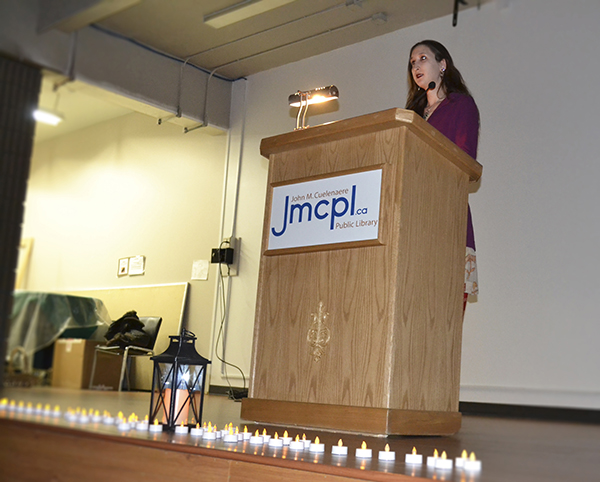
Jayda Noyes, Daily Herald
“(I said) ‘Mmm – I’m a girl? That’s what I identify as’ and some of them were a little bit more in depth with it: ‘What’s under your skirt? Do you have boobs? Where are your boobs?'” – Araveen Ethier
Candles glimmered in the John M. Cuelenaere Public Library on Tuesday for the Transgender Day of Remembrance vigil.
Prince Albert Pride hosted the city’s event, but ceremonies took place across North America to remember victims who were killed out of hatred.
Transgender woman Araveen Ethier chose to make a speech at the end of the ceremony.
She spoke about how her path to self-acceptance has been difficult and encouraged those who are struggling to come out.
“It’s gonna be hard, but each and every time, you’ll get stronger and I think that’s a really good tool to have—strength, faith, hope, because without those things, a tower may crumble.” she said.
Ethier told the audience about something that happened while working at a barbecue a few years ago for the Canadian Mental Health Association.
A group approached her and asked if she was a boy or a girl.
“(I said) ‘Mmm – I’m a girl? That’s what I identify as’ and some of them were a little bit more in depth with it: ‘What’s under your skirt? Do you have boobs? Where are your boobs?’” they asked.
Despite experiencing other similar situations, Ethier said she’s learnt others may not understand.
“After all those years of all that hate and all (those lashes) from people, you start to realize that you can be the bigger person. You can stand up for yourself and instead of shouting back or saying mean things, I choose to educate people,” she said.
Chair of Prince Albert Pride Marc Roberts read a list of transgender people who have died because of a hate crime in the past year in the United States.
He said the number isn’t recorded in Canada.
“I think it’s an important reminder of just how much more work we have to do. Everybody feels that we’ve come so far, we’ve made so many changes and yet the realization is there’s still people dying out there,” said Roberts.
He feels the public is aware of violence targeting certain demographics.
“I think that nowadays there is more of an emphasis, especially with what’s going on in the United States where you see these rampant hate groups and they’re targeting specific kinds of people. It’s not just you walk into a market and you shoot somebody. No, these people have gone to a Jewish synagogue and opened fire. These people have gone to a peaceful rally and run people over with their cars,” he said.
“There’s so many people focusing on small things and then lashing out in violence and I think that needs to be better addressed that (that) is unacceptable as a society.”
Roberts, who is a member of the LGBTQ community, said Prince Albert is an accepting environment.
“I don’t feel the level of hate that I feel in other communities. I think part of that is because we are such a diverse community between immigrants and Indigenous people and transient in population,” he said.
The Saskatchewan Rivers Public School Division’s Board of Education, Robert Bratford, spoke about their actions to tackle marginalization of transgender people.
The board developed a new vision statement in the last year with a core value of diversity.
In Carlton Comprehensive High School, they’ve made some washrooms gender-neutral.
Bratford said he’s noticed people’s reactions.
“It was troubling to see the level of discomfort when people would come to the washroom and they would be a little taken aback…the sign says these washrooms are for everybody and yet you have people thinking ‘Where’s the men’s washroom? Where’s the women’s washroom?’” he said.
Regardless, he’s found the addition creates a much safer space.
Coun. Tara Lennox-Zepp was unable to attend as well as Prince Albert Northcote MLA Nicole Rancourt; however, Rancourt sent a letter.
According to the Canadian Human Rights Commission (CHRC), in 2016, 52 of their discrimination complaints were related to sexual orientation. It was the highest number in almost a decade.
Transgender Day of Remembrance began with the fatal shooting of Rita Hester in November of 1998. Investigators never solved her case.
Cities have held these vigils every November–around the anniversary of her death–since 1999.

